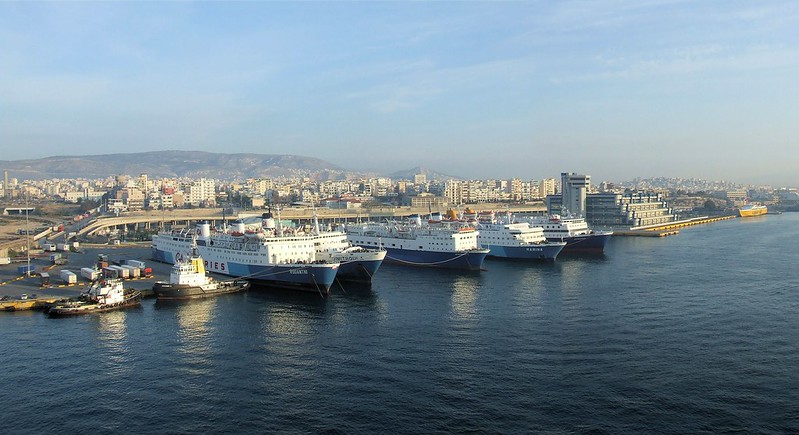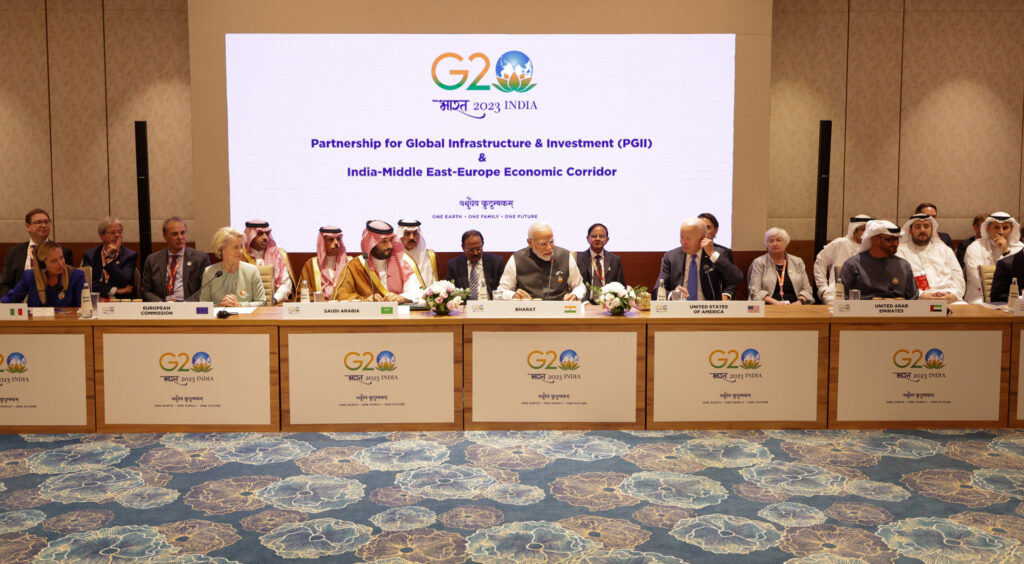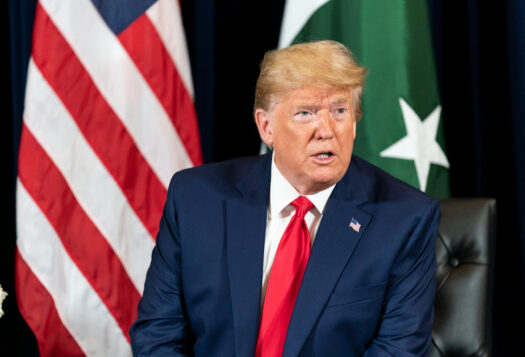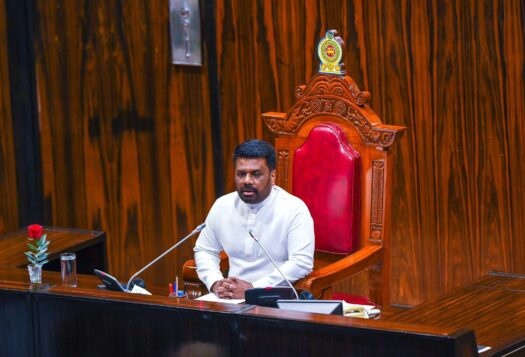
After five months of delays, the Indian government is finally forging ahead with plans for the much-touted India-Middle East-Europe Corridor (IMEC). On February 13, 2024, India and the UAE signed a framework agreement on the transcontinental corridor. Hyped as the G7 and India’s response to the Belt and Road Initiative (BRI), the project envisions an ambitious maritime and railway network, starting by sea from the western coast of India to the United Arab Emirates, then across the Middle East through rail, and then onto Greece and into Europe via Israel. Along the way, hydrogen pipelines and optical data cables will be laid down. Given the scale of the project, President Joe Biden has called it a “game-changing investment,” and Prime Minister Narendra Modi has asserted that the corridor will become the basis of world trade for “hundreds of years to come, and history will remember that this corridor was initiated on Indian soil [during the G20].”
IMEC optimists seem to hold a surprisingly adamant belief – found across the international community and certainly within the Indian strategic community – that the diffuse conflicts in the Levant and Gulf are unlikely to scuttle the project.
The Red Sea crisis has strengthened the decades-old argument on the need for an alternative to the Suez Canal, showing the wisdom of investing in projects like IMEC. For India, which seeks to institute an export-centred growth model, IMEC provides much needed access to the European market and further integration into global supply chains. For its part, the West is wary of China’s growing diplomatic heft and geoeconomic inroads in the Middle East. Meanwhile, experts believe the conceived hydrogen pipelines could play a critical role in stabilizing the Gulf economies as the world transitions toward decarbonization, since hydrogen-based “transition” fuels are produced from fossil fuel-based processes, such as methane reforming. For its enthusiasts, the list of wide-ranging IMEC benefits is seemingly endless. For a world retreating from globalization, transcontinental economic integration initiatives show the appeal of multilateral and transnational cooperation.
However, the geopolitical challenges facing IMEC should not be understated. For instance, the Greek Prime Minister Kyriakos Mitsotakis, during his visit to New Delhi earlier in February, strongly pitched for his country as a “natural doorstep to Europe and beyond.” He is not wrong, as the Greek port of Piraeus is the largest port in Eastern Europe and, theoretically, IMEC’s main entry point into Europe after the Haifa port in Israel. However, it turns out that a Chinese shipping company, Cosco, is the majority stakeholder in the port and controls its operations. As one analyst remarked, “At this point, it is unclear whether India and the United States overlooked this important strategic consideration or if they will attempt to buy stakes in Piraeus and shift the balance of power away from Cosco.”
Yet, before IMEC reaches Europe, its future clearly hinges upon stability in the Middle East. The IMEC optimists seem to hold a surprisingly adamant belief – found across the international community and certainly within the Indian strategic community – that the diffuse conflicts in the Levant and Gulf are unlikely to scuttle the project. As a prominent Indian expert recently argued, “The Gaza war has delayed [plans for the corridor], but it will not be enough to derail IMEC. The paramount logic of geoeconomic gains will eventually re-emerge with the potential to transform and pacify the region.” In recent years, many have also come to believe that authoritarian political systems in the Middle East will eventually circumvent public outrage over Israel’s war against Hamas in Gaza in favor of the corridor’s economic promises, a premise on which hope for IMEC’s future is partly built. After all, the argument goes that the Trump administration leveraged the same to achieve the Abraham Accords.

Recent events, however, have demonstrated that such optimism may simply be wishful thinking. On February 10, Israel launched airstrikes on Rafah, the city in Gaza’s far south where the Israeli government had ordered a million displaced Palestinians to flee. Israeli Prime Minister Benjamin Netanyahu has since vowed to authorize a fresh invasion to “finish the job” unless the remaining hostages are released. A day later, Saudi Arabia, which had just ruled out diplomatic relations with Israel “unless an independent Palestinian state is recognized,” then warned “of the extremely dangerous repercussions of storming and targeting” Rafah. The UAE and Jordan, key member states of the IMEC, reacted similarly, and Egypt has gone as far as to threaten the suspension of the Camp David Accords, the peace agreement which allowed Israel and Egypt to normalize relations if Israeli troops enter the city.
Amidst this ominous picture of the region’s future stability, IMEC would have to grapple with extensive logistical challenges. The railway system in the Saudi peninsula has significant gaps, with approximately 700 miles of missing links spanning from the Fujairah port in the UAE to Haifa in Israel alone. Much of the over 1250 miles of rail needed must be constructed in challenging terrain. Other critical initiatives built into the IMEC, such as clean hydrogen pipelines and digital cables, look great on paper, but no feasibility studies have yet been conducted on either proposal. Meanwhile, the dire political and security environment in the Middle East means that Arab states, particularly Saudi Arabia, are going to find it hard to even talk to Israel, let alone extensively engage at the working level to plan regional integration projects.
IMEC’s troubles do not end in the Middle East. The shipping route from Israel to Greece passes through waters disputed by Turkey, which is not a part of IMEC. A day after IMEC’s announcement, President Recep Tayyip Erdoğan declared, “There’s no corridor without Turkey.” More importantly, much of the project’s bill, which could run up to hundreds of billions, is expected to be footed by the West, specifically the G7-led Partnership for Global Infrastructure and Investment. Given Europe’s present economic troubles, its commitment or ability to finance the multi-modal project in the near future is questionable. Analysts, such as Anchal Vohra, have already suggested that the project is more of “a talking point for upcoming elections rather than a serious project in which the West will invest serious money,” particularly since the European Parliament, the United States, and India are all going to the polls.
For observers in India, the parallel with the International North-South Transport Corridor stands out, and it seems like IMEC’s destiny will follow a similar pattern – years of delays, misplaced enthusiasm by world leaders, and consistent lament by analysts and experts.
Finally, the backing of the United States is critical to IMEC. A predominant viewpoint that has emerged in Indian foreign policy, underpinning New Delhi’s commitment to the corridor, is something Deng Xiaoping observed in 1979: “All countries that fostered good relations with the United States have become rich.” Yet, the United States which laid the groundwork for “hyperglobalization” in the second half of the 20th century looks very different under its current administration. Furthermore, if Donald Trump, a candidate both lauded and criticized for his transactional approach to international partnerships, wins the 2024 election, Washington could easily take a U-turn on IMEC, not least because the economic benefits for the United States are peripheral.
At present, it is hard not to be pessimistic about IMEC, given its myriad challenges in the near term. For observers in India, its parallel with the International North-South Transport Corridor stands out, and it seems like IMEC’s destiny will follow a similar pattern – years of delays, misplaced enthusiasm by world leaders, and consistent lament by analysts and experts.
Also Read: Making Sense of India’s Muted Response to the Red Sea Crisis
***
Image 1: Piraeus Port, Greece via Flickr
Image 2: IMEC Unveiled during G20 Summit via Wikimedia Commons


